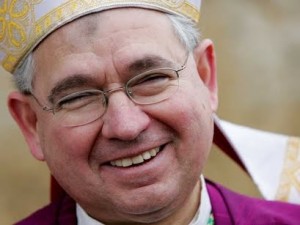
The Secretariat of Clergy, Consecrated Life, and Vocations of the United States Conference of Catholic Bishops (USCCB) has been awarded a grant from the Conrad N. Hilton Foundation that largely underwrites a comparative cultural survey of Catholic youth in the United States.
The survey aims to identify common and distinctive cultural traits that affect the openness and ability of Catholic youth to respond to a call to a vocation to the priesthood or religious life. The Secretariat has commissioned the Center for Applied Research (CARA) at Georgetown University to conduct a national survey of never-married Catholics, ages 14 and older, to study their views about vocations and their own consideration of a vocation.
Statistical data found in two reports commissioned by the Secretariat, “The Class of 2011: Survey of Ordinands to the Priesthood” and “The Profession Class of 2010: Survey of Women Religious Professing Perpetual Vows,” indicate fewer than expected religious vocations among the Hispanic and Latino Catholic population in the U.S.
Father Shawn McKnight, executive director of the Secretariat, said that Hispanics/Latinos constituted 15 percent of the ordination class and 10 percent of the religious profession class, while constituting 34 percent of the total adult Catholic population.
“There is not enough objective data to explain the reasons for their underrepresentation,”Father McKnight said.
The Secretariat seeks to identify specific reasons for their underrepresentation, to guide the efforts by dioceses and religious communities to promote vocations.
In the same reports, other cultures show a stronger representation. For example, Asians constitute four percent of the adult Catholic population in the U.S., yet 10 percent of the past year’s ordination class were Asian.This is a consistent trend over the past 15 years. In the 2010 class of women who made their religious profession of perpetual vows, 19 percent of the entire class was Asian.Further study is needed to explore why there is such a difference in representation.
The identification of cultural elements that support and challenge a culture of vocations among Asian, Latino and the general youth population would be helpful information for collaborating organizations, such as the National Religious Vocations Conference and the National Conference of Diocesan Vocation Directors.The results of this study would also benefit those involved with the evangelization of youth, as they would indicate how the influences of culture impact the ability to reach out to all Catholic youth.
“This study will aid in the New Evangelization by serving as a helpful resource in determining emerging needs within the Church as well as assisting in the development of timely and effective responses,” said Peter Murphy, PhD, executive director of the USCCB Secretariat of Evangelization and Catechesis.
“The success of ministry among a growing number of Hispanics/Latinos requires leadership from the Hispanic/Latino community itself, especially in the priesthood and religious life,” added Father Allan Deck, former head of the USCCB Secretariat for Cultural Diversity in the Church. “This proposal is the single most important effort to find the best ways to provide the priestly leadership necessary for Hispanics/Latinos to flourish in the Church.”
Courtesy of the United States Conference of Catholic Bishops.